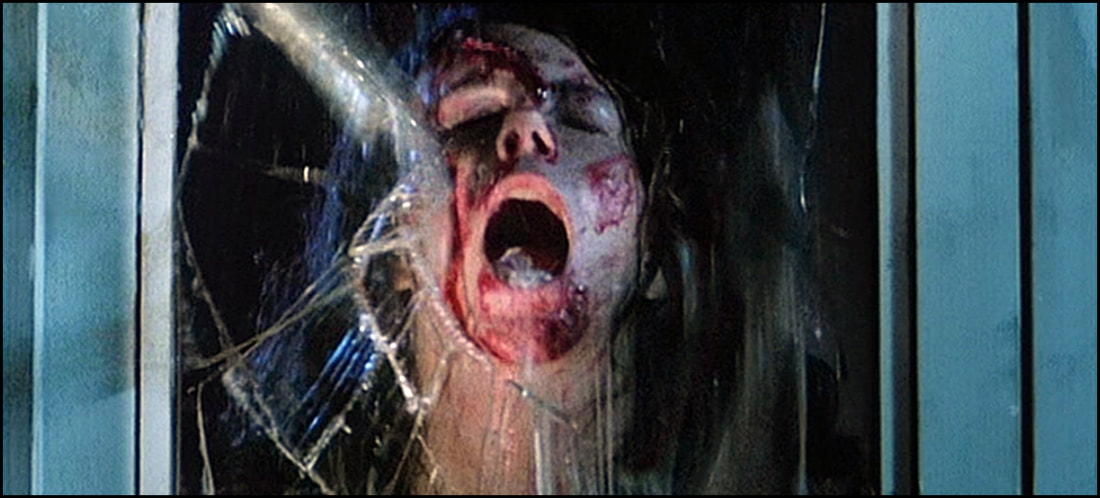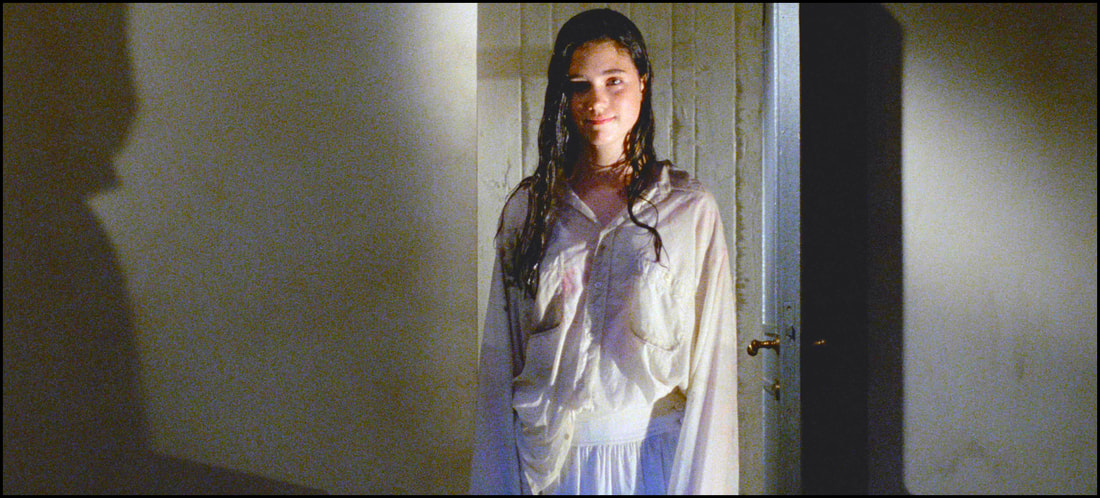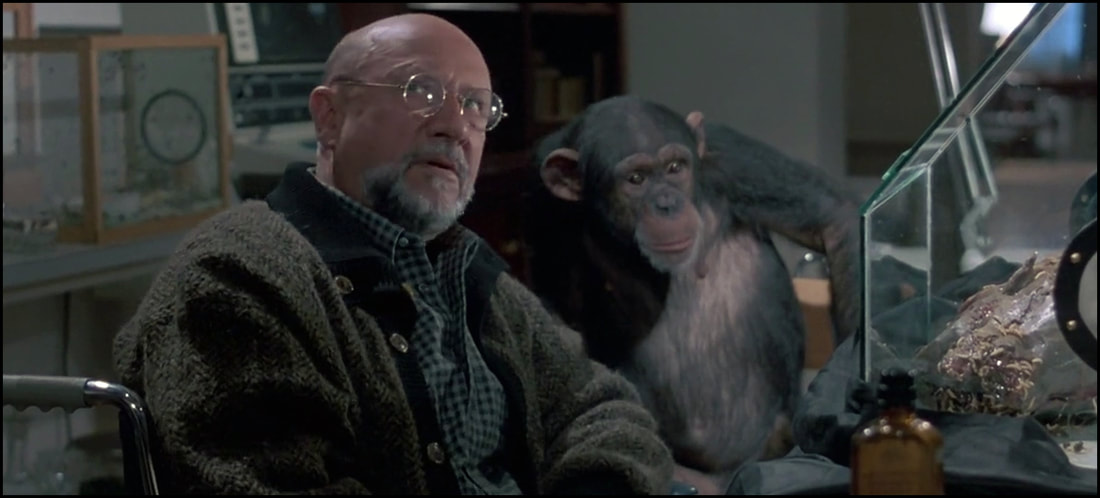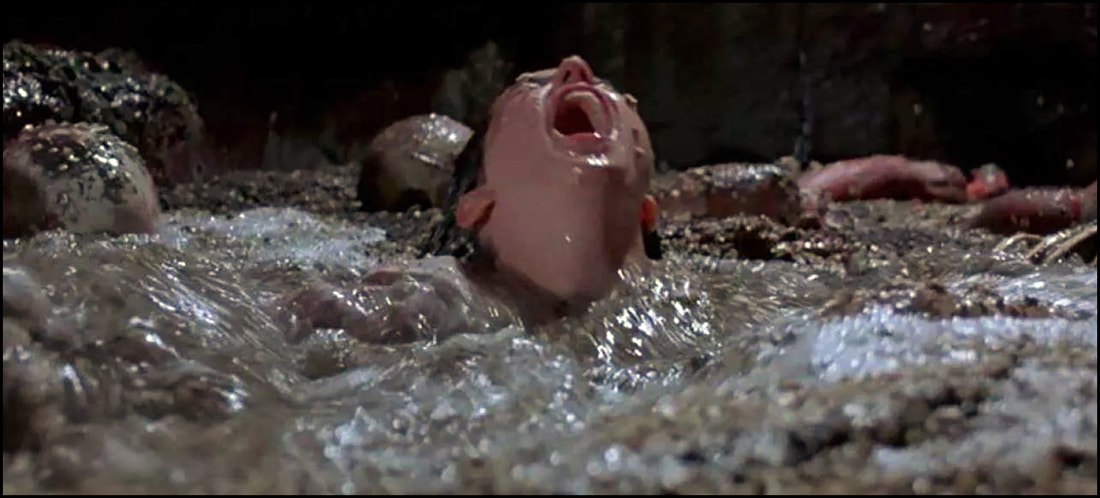Newcomers exploring their first Giallo might come away more than a bit confused if not downright disgusted. Chillers unfold at a smoldering pace not seen typically outside of Italy as these directors and screenwriters don’t often follow the same framework in both presenting and solving the central mysteries. Certainly, repeat exposures to similar fare helps a viewer reach a greater understanding of this unique sub-genre; but the real treat often comes when repeated viewings of the same film gradually open one’s eyes to some of the hidden moments of genius that escaped an earlier screening. I’ve often said that – in the U.S. – Horror audiences will watch a domestic release over and over again solely to recapture the resulting visceral thrill; by contrast, Giallo fans endure their flicks over and over again in order to see what they missed previously. That’s not exactly two sides of the same coin.
And I’ve really only recently had the good fortune to explore some of the pictures in noted Giallo master Dario Argento’s catalogue, of which Phenomena (1985) has landed on my desk from Synapse Films. While many reviewers have christened the feature as one of Argento’s very best theatrical ventures, I’d definitely stop short on suggesting that this be your very first dalliance with the genre. (Again, please keep in mind that I say this while admitting I’m somewhat of a novice myself!) In short, it’s fairly tame – there’s very little bloodshed and occasionally a bit confusing. But it does boast a terrific performance by Donald Pleasence alongside a somewhat muddled job from a young Jennifer Connelly that makes it worth its weight in blood … so I suppose that might be all that matters in the big finish.
(NOTE: The following review will contain minor spoilers necessary solely for the discussion of plot and/or characters. If you’re the type of reader who prefers a review entirely spoiler-free, then I’d encourage you to skip down to the last few paragraphs for the final assessment. If, however, you’re accepting of a few modest hints at ‘things to come,’ then read on …)
“A young girl who has an amazing ability to communicate with insects is transferred to an exclusive Swiss boarding school, where her unusual capability might help solve a string of murders.”
For what it’s worth, Phenomena evolved as a particularly tantalizing idea from the mind of director Argento (who also collaborated with Franco Ferrini on the script): personally interested in the field of forensic entomology – the study of insects as associated to crime – the storyteller set out to show just how a bunch of flies and maggots ultimately serve as nature’s greatest detectives. For those unaware, these bugs dine on our flesh once we’ve expired, so pathologists will examine these arthropods found at crime scenes in hopes of piecing together elements like the time and place of death.
Months after a stranded Danish teenager is viciously murdered and left for dead in the Swiss countryside, revered entomologist John McGregor (played by Pleasence) is finally consulted by local authorities. His assistant had also gone missing and was presumed to have been a victim of the same senseless butcher, so he’s all too happy to lend his expertise to Inspector Rudolf Geiger (Patrick Bauchau). Still, at this point, the police have exhausted all leads.
At the same time, young Jennifer Corvino (Connolly) is arriving for a protracted stay at the nearby Richard Wagner Academy for Girls, shipped off to the exclusive institution by her wealthy actor/father whose career has him off trotting the globe for work. Lo and behold, we soon learn that Jennifer has a secret affinity for bugs, so much so that she’s crafted a telepathic connection with them, one that has them responding to protect her when she’s in any moments of distress. Thus, it shouldn’t take anyone with a degree in screenwriting to predict that these two insect aficionados will ultimately find and befriend one another because that’s exactly what happens in the world of cinema relationships!
Oh, but were that where Argento and Ferrini’s constructs stopped!
Young Jennifer is also plagued by unexplained sleepwalking, an act that Argento preternaturally stages like some out-of-body experiences. It’s during this pivotal nocturnal outing that she both witnesses an all-new murder, falls out a building, and is nearly mowed down in traffic! After being briefly kidnapped by a pair of Swiss teens, she finds herself awake in the forest, now in the arms of McGregor’s chimpanzee/assistant Inga. Of course, the chimp takes the young lady home, thus finally uniting bugman with bugwoman, and their friendship is born.
Sigh.
Without tarnishing anything further, Phenomena continues down this path of incessant good fortune all the way up until it’s last shocking kill (I won’t spoil it). The fact that luck alone – or is that bad luck? – propels so much of what happens in this world definitely puts this one in fairly predictable territory, but I will say that Pleasence alone – right up until his sad (but foreseeable) demise – is reason enough to endure the picture. The man rather effortlessly moves through each and every scene, giving the film some authentic, welcome, and believable gravitas in places where it’s needed most. Argento might be a master with visual finesse – blood or not – but films are still stories about people … and it takes a human the caliber of Pleasence to give substance to so much of this one’s shadows and light.
Connelly, by comparison, seems lost, some of which is likely owed to her age and inexperience.
A quick look at IMDB.com suggests that this was her first big theatrical break; and – at the ripe age of fourteen – carrying a picture as much as she’s required to do here was a daunting challenge. (Once she arrives in the flick, she’s in quite a bit of it.) There are moments when she delivers – her moments with Sophie in their dormitory room are quite good, and she shares the screen with Pleasence in their collaborative moments quite well. Theirs is a kinship that’s entirely plausible (well, except for the coincidences), and he becomes an almost surrogate father for the displaced child. But because far too much of Phenomena’s Horrors feel somewhat formulaic, the resulting thrills, spills, and chills she endures just don’t quite resonate the way other scream queens (in their respective youth) performed.
Lastly, the picture feels like one of those efforts that just missed its mark, much of which is owed to the fact that perhaps its central player – Argento – bit off more than he could chew. Writing and directing are very personal endeavors, at times so intensive and exhaustive that they can no doubt blind one to the weaknesses inherent in poor writing, underplayed moments, or sloppy plotting. Perhaps the services of a script doctor – another pair of eyes who could’ve taken a stab (pun intended) at a few key scenes – might’ve helped the film’s overall tone. Maybe even trimmed some fat in a few places. (There’s a sequence involving a forced EEG that seems kinda/sorta wildly out of place.) At times, Phenomena seemed like it was lightly poking fun at itself – maybe even mocking some of the tropes required of the genre – and I don’t think that was intentional.
Or perhaps I should say I hope that wasn’t intentional.
As for the technical specifications?
Wowsa! This two-disc collection contains not one, not two, but three different cuts of the big show (the Italian version, the International version, and the U.S. “Creepers” version). The Italian version (Disc 1) hosts an audio commentary by author Troy Howarth (it’s particular entertaining and actually helps make a second watching of the flick very enlightening). There’s also a feature-length documentary on the making of Phenomena along with a music video and other associated publicity materials. Disc 2 houses the alternate versions along with a different audio commentary with authors Derek Botelho and David Del Valle. There’s also a visual essay, alternate audio/stereo mixes, and some additional publicity bits from around the world. It’s a fabulous collection, one that’ll keep fans focused for some time.
Recommended.
As I’ve always tried to be clear, I’m neither an expert on Giallo films nor that big a fan of them. What I do like is stories that are compellingly constructed with characters that are engagingly performed; and – on that respect – Phenomena kinda/sorta ebbs and flows a bit too much. Its highs are great, but its lows are almost painstakingly banal. Argento was a fan of some slow building, simmering tension; in here, it works more often than it fails, but when it fails it’s pretty obvious. Some takes are just too long, and – once again – I can’t help but wonder if another pair of eyes might’ve tightened this one up in places wherein some tidying could’ve been more effective.
In the interests of fairness, I’m pleased to disclose that the fine folks at Synapse Films provided me with a complimentary 4K Ultra HD of Phenomena (1985) by request for the expressed purposes of completing this review; and their contribution to me in no way, shape, or form influenced my opinion of it.
-- EZ





 RSS Feed
RSS Feed